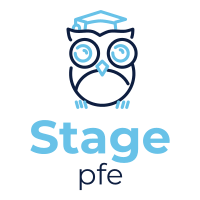
Design brief is a vital concept or management tool concerning a project’s preplanning stage, specifically the technicalities or expectations involved in a design project. That being said, how creative, effective, or successful a design project is would greatly depend on the quality, structure, and overall strategy of the design brief—your best blueprint for outlining design deliverables.
[bb_toc content=”][/bb_toc]
Design Brief Definition & Meaning
Design brief is the ultimate strategic blueprint for creative-driven projects wherein it outlines the product deliverables, design tasks, and other objectives to complete a design project.
A design brief is every designer’s detailed plan to keep track of the timeline, responsibilities, format, and other technicalities involved in executing a creative project.
What Is a Design Brief?
A design brief answers the who, what, when, where, why, and how of upcoming design projects, and it can tackle designs related to any industry such as architecture, fashion, technology, school, website, construction, engineering, or interior design. This essential document is responsible for explaining and helping the clients, project workers, and stakeholders understand what to expect in delivering a design project. A design brief is a must-have design project management tool to keep you confident in boosting the success rate of your creative pursuits.
10 Types of Design Brief
Interior Design Brief
Aesthetically pleasing residential or working environments are made possible with a well-planned interior design. With an interior design brief on hand, clients and interior designers can easily get the full summary of the interior design project’s deliverables. The interior design brief usually concerns the scope of work, client expectations, project goals, budget, and more.
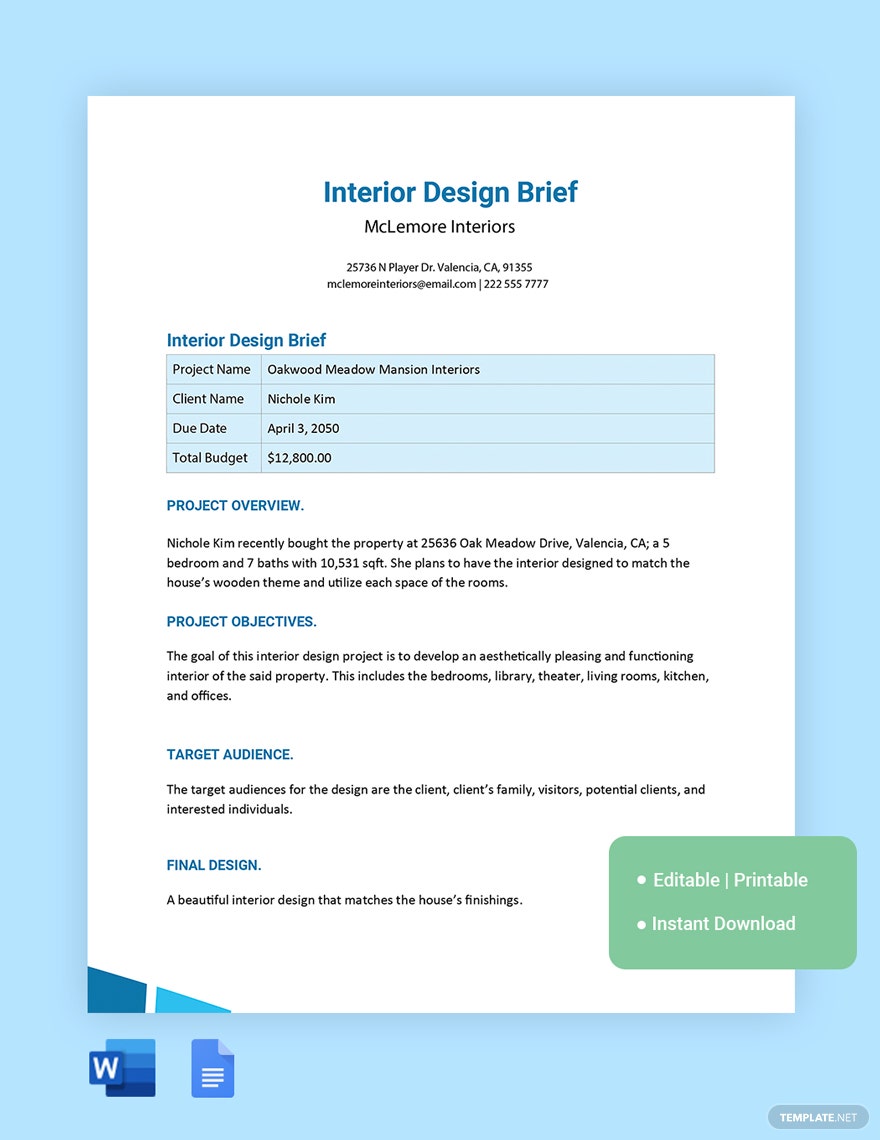
Product Design Brief
Any form of product, whether you deal with student clothing, industrial woodwork, or even medical equipment, deserves a professionally made and curated design plan. This is where the product design brief is at play so that the final product meets the target goals, functions as intended, or sells well in the market. Expect a product design brief to lay out the product specifications, sketch model, proposed budget, and product task deliverables.
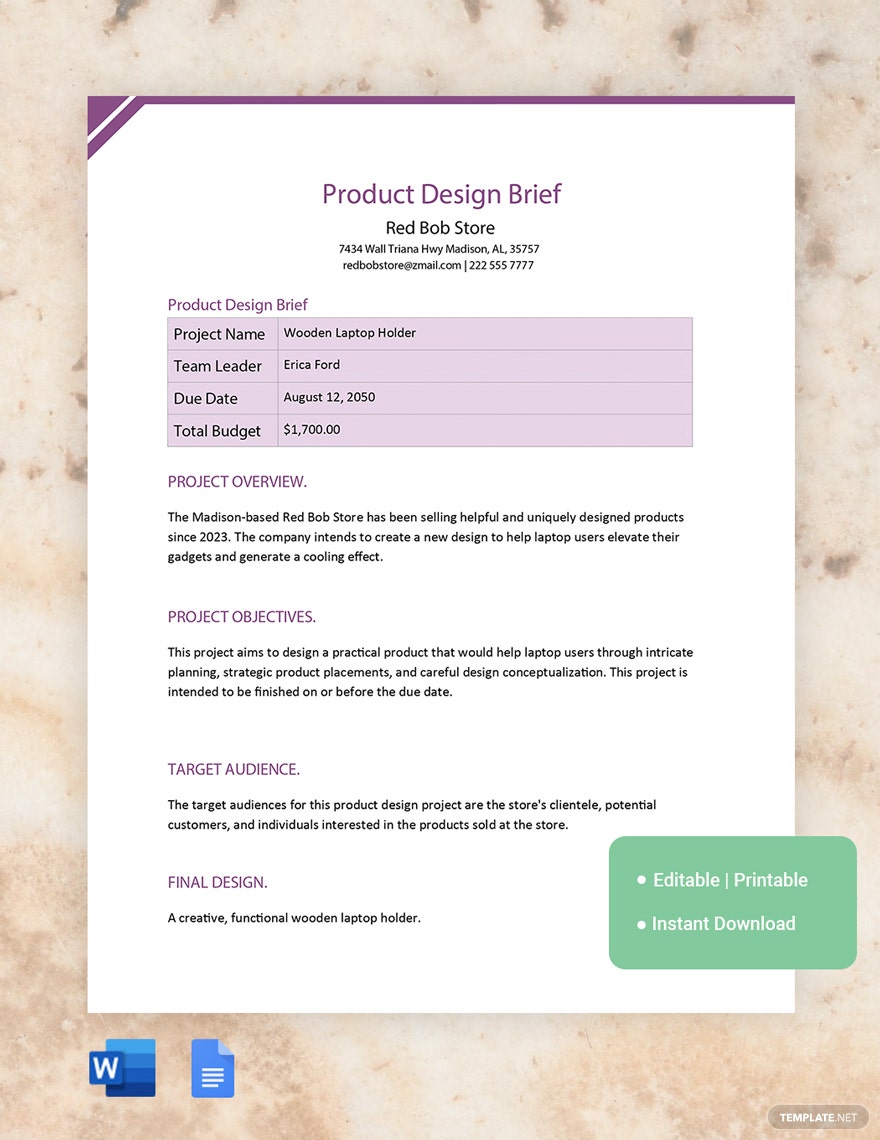
Building Design Brief
Architects and builders alike would greatly benefit from a building design brief to ensure that the standard building principles, building project layout, type of building project, and other concerns involving a building’s structural design are covered. This type of brief still covers the basic design brief elements such as the project overview, scope of work, target audience, etc. However, the design brief’s data is wholly concerned with building design projects such as a grade school building, art studio building, or business agency building.
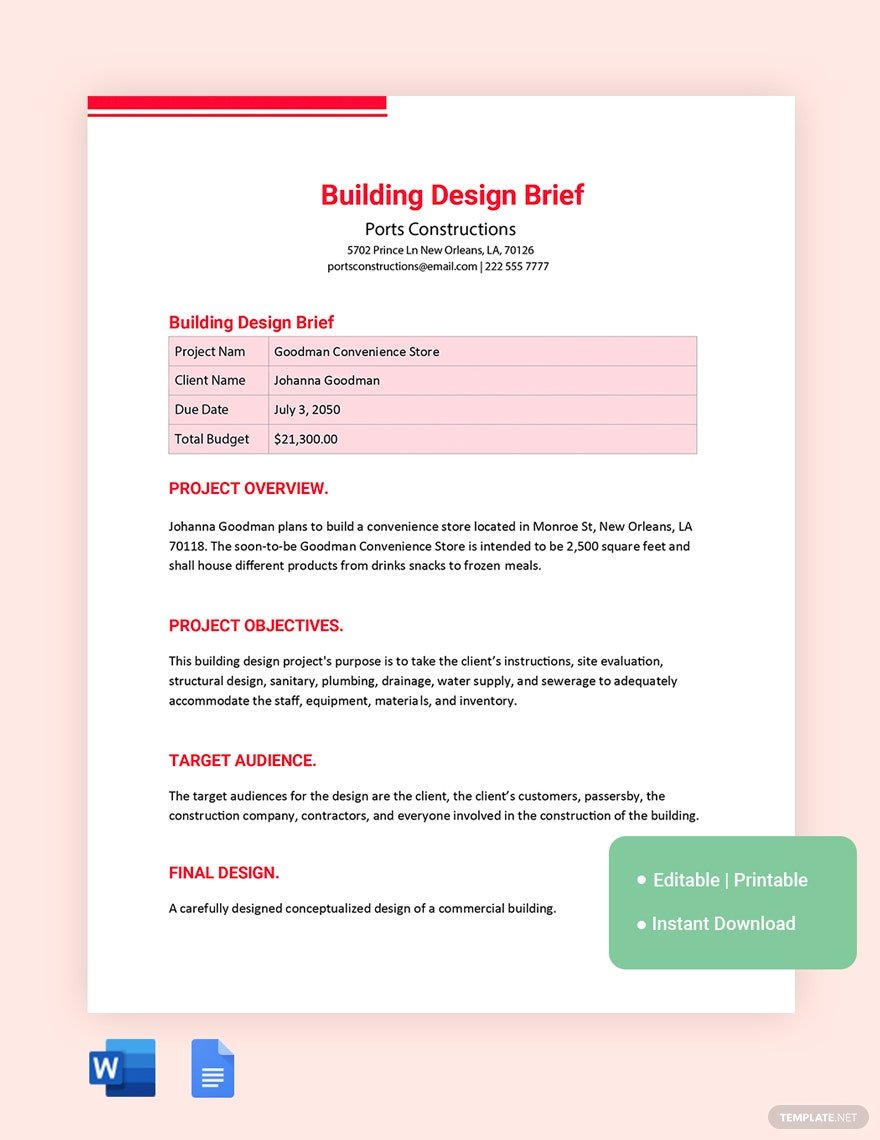
Simple Design Brief
Those who are new to making a design brief can start by optimizing a simple design brief template. Touted as every design brief beginner’s guide, the simple layout, format, and design of this specific design brief are easy to follow, even for newbies. That means the design brief’s details here are pretty brief and straightforward rather than explaining the technicalities of a design project in a complex approach.
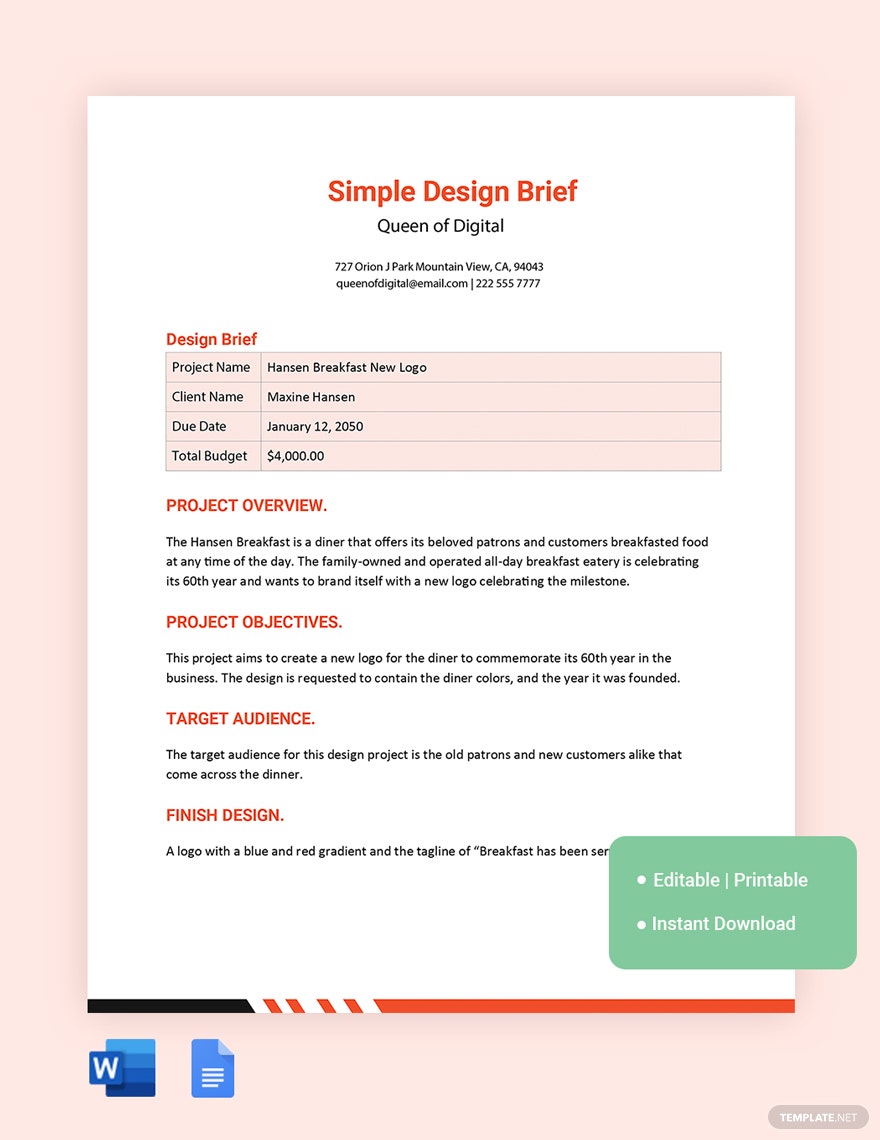
UI Design Brief
A user interface (UI) design is a common term in digital projects where human-to-computer communications or interactions run flawlessly. To make sure the design aspects of your UI project runs on a smooth sail, be sure to display the specifics effectively using a solid UI design brief. UI designers will surely have a pleasant time achieving their goals when the overview, tasks, and conditions are explained thoroughly in an easy-to-read document such as a design brief.
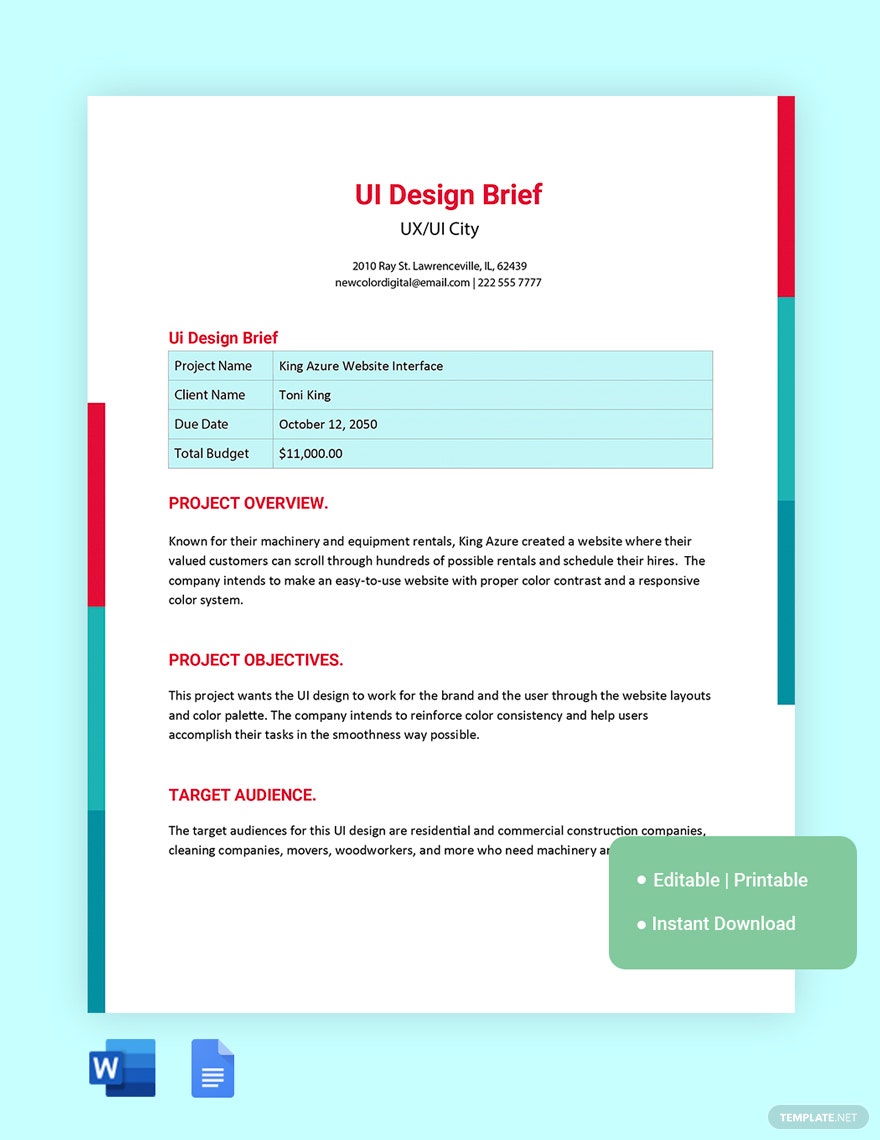
Logo Design Brief
Any organization’s logo is never decided on a whim because it has to be carefully planned and designed, such as considering how unique, memorable, or creative the proposed signature logo is. As you initiate a logo design brief, there is more room to think if a graphic logo design is actually worth it and doable. Rest assured, designers would appreciate it a lot if you cover them with a logo design brief so that they know what sort of expectations you have for them to achieve.
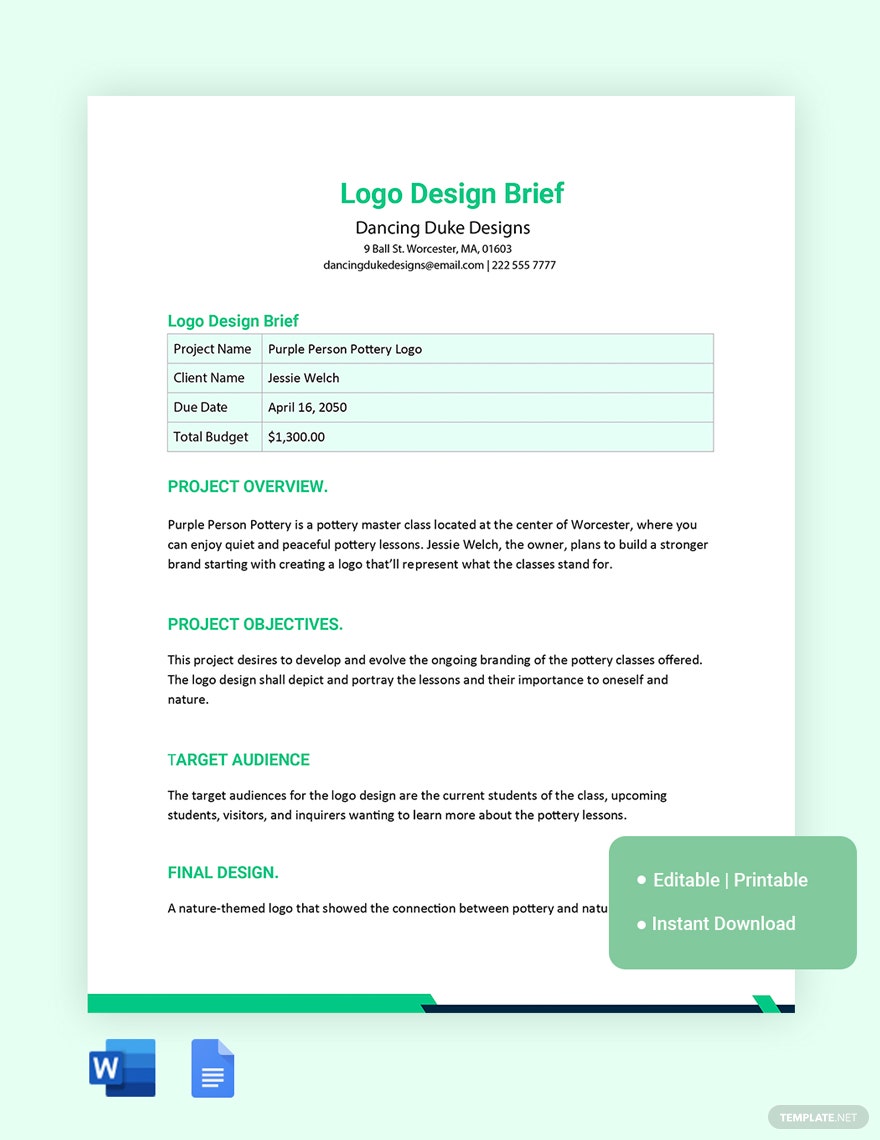
Web Design Brief
Consider a web design brief as an official outline to clearly understand the requirements, timelines, and procedures involved in designing your own website or app. Websites are nuanced in design in the first place because in designing a web profile, for example, you deal with a lot of factors such as the about-me statement, company history, contact details infographic, graphic color patterns, and lots more—and that is for the profile section only meaning there are still many aspects to design on a website. Hence, lay out a website’s predetermined design in a well-documented design brief.
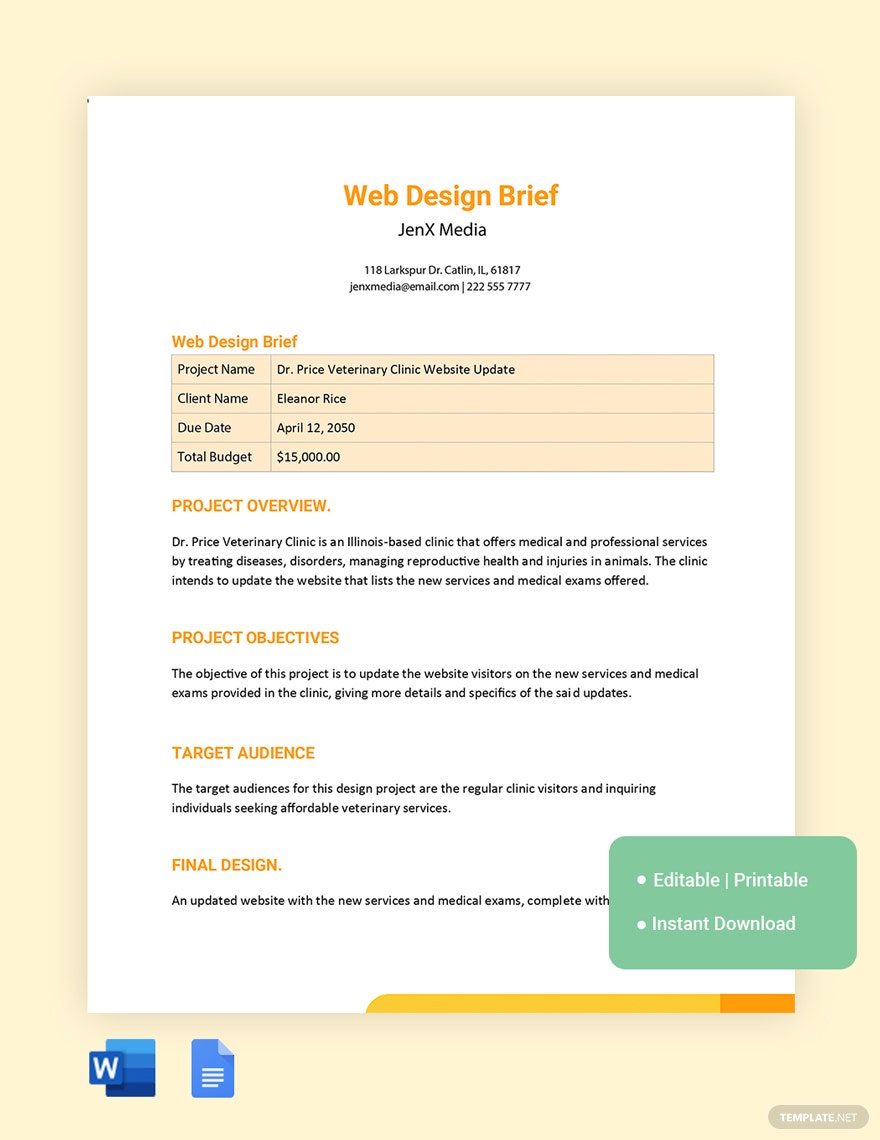
Graphic Design Brief
Icons, fonts, 3D/2D models, UI kits, pictures, templates—you name it; there are so many outputs you can concoct out of graphic design. Be sure to incorporate a detailed graphic design brief on your future creative projects so that your graphic works actually pay off. That way, you won’t end up producing endless graphic designs with uninspired or unplanned results.
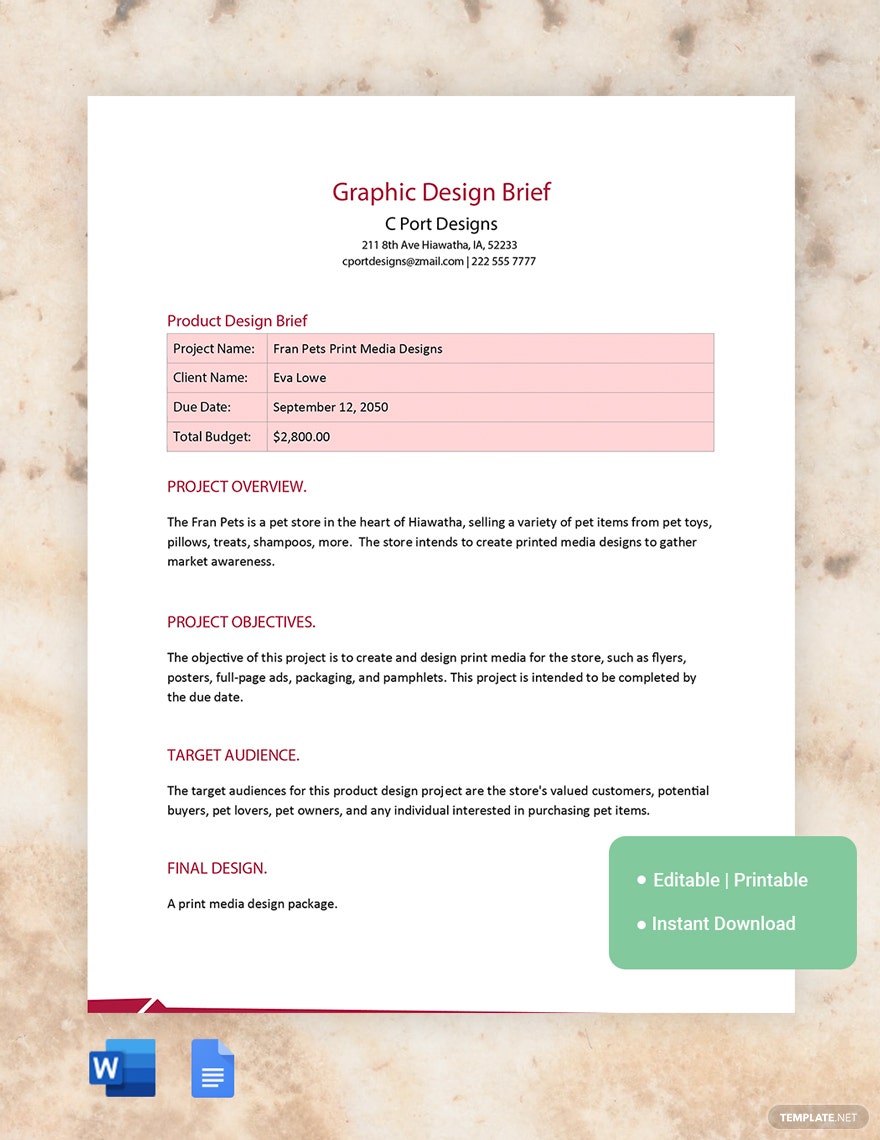
UX Design Brief
The user experience or UX design brief is a brilliant tool to formulate products that offer convenient and meaningful experiences for users. With the UX design brief, designers and clients can be on the same page about a design project’s goals and specifics. Take this design brief as your solution to remedy the challenges brought on by your UX design processes.
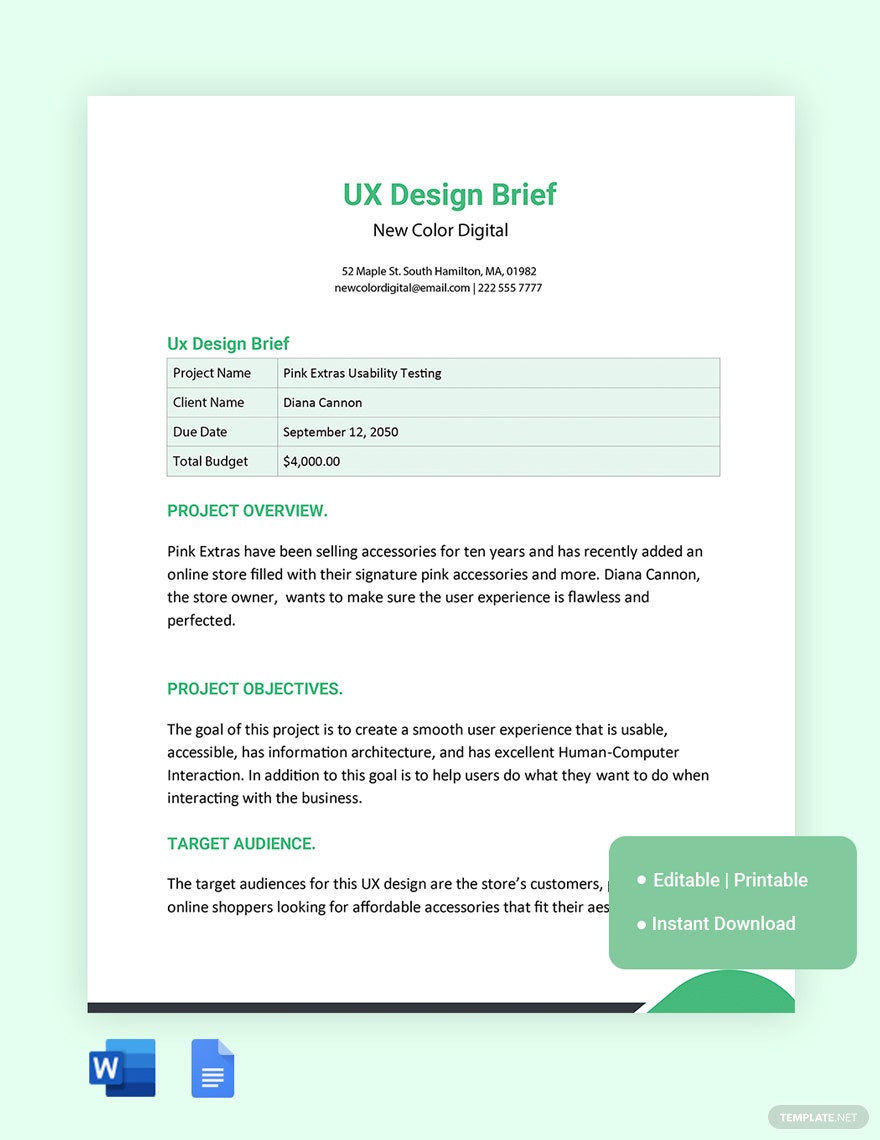
Design Brief Uses, Purpose, Importance
Whether you are new to the concept of a design brief or not, it is necessary to be reminded about its functions, purpose, and significance in design, especially when you may have overlooked some aspects of it. A design brief isn’t prominent or a force to be reckoned with in the world of design project management for nothing anyway.
Sets Realistic Client Expectations
A design brief helps clients understand or be familiar with what to expect out of a design project they paid for. Clients would be happy to feel involved or updated about a design project’s goals, budget, timeline, and other important notes rather than just keeping them in the dark. Most importantly, there is a sense of realism to the planned outputs for a design such as how to get the best quality of a design project according to the time and budget allocated to making it happen.
Educates Designers on Design Objectives
Not only do clients benefit from a design brief but also the designers themselves. Remember that the project overview, budget, design project tasks, target audience, and many other design project elements are showcased in the design brief, and those are the main technicalities that designers refer to in order to fulfill the design project’s objectives. Hence, every designer involved in a creative project will be knowledgeable of the 5Ws and 1H of a design project.
Facilitates Project Management and Progress Tracking
Don’t forget that the design brief itself facilities project management, communication, and monitoring. That means anyone involved in a design project will know what the standards are to fulfill the project requirements, who to refer to for any design project concerns, and how to keep track of the tasks at hand in a creative project. The point here is that the design brief makes design projects easier and more efficient.
Offers Upfront and Well-Documented Specifics
A design brief is supposed to be detailed yet specific from the project overview down to its closing statement. If you see the common layout of every design brief out there, it isn’t just one document with one long paragraph because the details are divided into parts or sections. The parts of a design brief are what make a design brief easy to follow, especially when you can familiarize them later on.
Reminds the Dos and Don’ts of a Design Project
Whether there should be a graphic mind map, quote section, and content analysis or there shouldn’t be any freelance branding, typography, and innovation scheme, rest assured, the do’s and don’ts involved in a design project are easy to be aware of. The design brief tells you what is right or wrong to do in a design. In case you forget certain details about a design project, especially if it is long and tedious creative work, simply refer to the brief for answers.
What’s in a Design Brief? Parts?
Company Letterhead
The company letterhead or profile brings identity to the persons or team members behind the design brief. A company profile should acknowledge your business name, type of business, list of members and stakeholders, company address, contact information, and even your company’s signature logo or trademark.
Project Overview
A crucial element to any design brief is the project overview aka the full summary of what your design project is all about. This part is where you mention the project description, scope of work, design project background statement, and other specifics that add context to the whole design project.
Goals and Objectives
The goals and objectives are where you reflect on the specific deliverables to meet the purpose of your design project. Remember to set specific, measurable, attainable, relevant, and timely goals aka SMART goals in a design brief so that the actual objectives to achieve have a higher success rate.
Target Audience
Who are the users, clients, or audiences expected to benefit from your design project? Understand the proper target audience such as the people’s key demographics until you can create informed decisions that would please your audience in the final design of your project.
Design Requirements
Goals tell you what to do while design requirements refer to the specific set of standards that should be observed while working on a design project. The most common design requirements are the design dimensions, asset resolutions, file formats, required color palettes, and other related design deliverables.
Budget and Schedule
The budget and the schedule affect a design project’s output greatly because making too many expectations of a design output with a low budget and hectic schedule would lead to a disaster. The budget clarifies the project’s budget and allocation of resources while the schedule sets the timeline for when to do the project tasks and how to manage them on time.
How to Design a Design Brief
1. Decide the proper Design Brief Size
2. Identify your purpose for the design brief
3. Customize a Design Brief Template
4. Insert the parts of a design brief
5. Set an easy-to-read format, layout, and design
6. Save what you made and publish it
Design Brief vs. Creative Brief
A design brief concerns more about a design project’s preproduction stage and industry requirements.
A creative brief focuses more on the innovative or progressive execution of a creative project.
What’s the Difference between a Design Brief, Project Plan, and Proposal?
A design brief is a detailed outline or layout discussing the critical details of a proposed design project.
Project plans are formal documents that outline the goals, tasks, and stages of accomplishing a project.
A proposal is a proposed plan written in a detailed document that is used for suggesting an idea or making an informed decision afterward.
Design Brief Sizes
Like any other formal business document, a design brief follows the three main standard paper sizes; however, you can always customize the dimensions and formats depending on your purpose. Nevertheless, the most widely accepted design brief sizes are the letter, legal, and A4 sizes.
Format | Inches | Millimeters |
| Letter | 8.5” x 11” | 215.9mm x 279.4mm |
| Legal | 8.5” x 14” | 216mm x 356mm |
| A4 | 8.3” x 11.7” | 210mm x 297mm |
Design Brief Ideas & Examples
Considering that you can design anything for various types of industries, you can bet that there are a plethora of examples and types of design briefs out there too. You can always refer to a range of design brief ideas and examples to implement your design project whether it is for personal, educational, or business reasons.
- Design Brief Ideas and Examples
- UX Design Brief Ideas and Examples
- Graphic Design Brief Ideas and Examples
- Web Design Brief Ideas and Examples
- Logo Design Brief Ideas and Examples
- UI Design Brief Ideas and Examples
- Simple Design Brief Ideas and Examples
- Building Design Brief Ideas and Examples
- Product Design Brief Ideas and Examples
- Interior Design Brief Ideas and Examples
FAQs
What should a design brief include?
The most notable design brief inclusions are the company profile, business overview, design project objectives, target audience, competitor information, problem statement, project tasks, budget and schedule, and other design project specifications.
What are the steps of a design brief?
Follow these basic steps on how to form a design brief: write a business overview, determine the scope, define your audience, get to know the competition, prepare SMART goals, identify your resources for the design project, recognize the budget and the schedule, and more design project specs.
What is a design brief for grade 8?
A design brief for grade 8 is a type of brief aiming to design highly effective lesson plans used for teaching grade 8 students.
What are the constraints of a design brief?
A design brief has two types of constraints: stylistic constraints (brand standards, design limits, aesthetic choices) and commercial constraints (labor, time, budget).
What is an architecture design brief?
An architecture design brief is a document that contains crucial information about an architectural project concerning the architects, builders, and clients.
What does a design brief cover?
A design brief covers the profile/letterhead, project overview, goals and objectives, target audience, design requirements, budget, and schedule.
What is a design brief in technology?
A technology design brief refers to the proposed design of a specific technology, particularly the scope, requirements, and criteria for coming up with a successful project involving technology.
What are the specifications of a design brief?
The standard design brief specifications are the function, aesthetics, materials, target audience, performance, and environmental aspects.
What is an effective design brief?
An effective design brief contains all the critical data about a design project, and most importantly, it contains the complete parts of a standard design brief.
Why do we need a design brief?
A design brief basically guides us on how to execute a design project that aligns with the project scope, scale, target market, and other specs.
